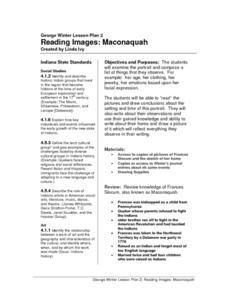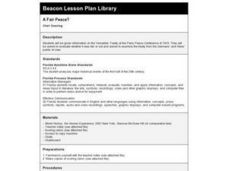Curated OER
Around the World Calendar
Students examine world landmarks and monuments. They create a 12 month calendar featuring a significant site for 12 different countries.
Curated OER
Understanding and Appreciating Poetry: Afro-Americans and Their Poetry
Sixth graders are introduced to poems written by African-American authors. As a class, they read excerpts of poems from different time periods and discuss how and if anything has changed over time with discrimination and equal rights...
Curated OER
Happy Endings: The Final Battle
Fifth graders explore all the myths of the battle of Yorktown. A variety of primary documents are viewed and analyzed for discussion. They become aware that what one sees and hears is not always as it seems in reality. Each group...
National First Ladies' Library
A Settlement House Hall of Fame
Young scholars identify, interpret and define a great deal about the Settlement House Movement of the Progressive Era, as well as about the women who were largely responsible for bringing the movement to life. They also research the life...
Curated OER
April Fool's Day
Pupils research how April Fool's Day began. They identify and discuss various theories, interview family members, write original myths about the first April Fool's Day and design a wild goose chase for another class.
Curated OER
Reading Images: Maconaquah
Students examine a portrait of Maconaquah and compose a list of things they observe about her. They look at her age, clothing, jewelry, and her emotions based on her facial expression. Conclusions are drawn as they "read" the pictures...
Curated OER
The Man Who Made the Normandy Invasion Possible, Andrew Higgins
Students examine the contribution of Andrew Higgins to WWII. They watch a video about Andrew Higgins and the Normandy invasion, answer questions about the video, and write an obituary for Andrew Higgins.
Curated OER
Thomas Jefferson: Philosopher of Freedom
Students view a documentary on Thomas Jefferson. Statesman, scientist, architect, president-he was America's dashing Renaissance man. After viewing, students discuss what they saw then write their own version of a biography of Thomas...
Curated OER
A Fair Peace?
Students read the Treaty of Versailles and examine it from different points of view. They evaluate the fairness of the treaty from the perspective of the different countries involved.
Curated OER
Killing Fields
Students view a television program that explores people's perceptions and expectations in war prior to and after WWI. They discuss the effects of trench warfare and write a journal entry or short oral report reflecting on their...
Curated OER
Celebrating Benjamin Franklin
Students explore various websites featuring the life and achievements of Benjamin Franklin. They investigate Franklin's roles in colonial society as well as pictures of his various inventions. They view excerpts of historical documents...
Curated OER
Dress Reform in the 19th Century
Students read and discuss the writings of Elizabeth Cady Stanton, Timothy Shay Arthur and others to explore mid to late 19th century dress reform. They use their findings to write a letter to an editor from a 19th century viewpoint.
Curated OER
Weather and the D-Day Invasion
Students study the weather that occurred during the invasion of Normandy. They research using the Internet to locate information about the invasion and the meteorologists who helped during the war effort. They
Curated OER
Around the World Calendar
Students explore a country and its culture through its national landmarks. They use technology tools to research and communicate information. To demonstrate research skills, they use the Internet as well as print materials.















